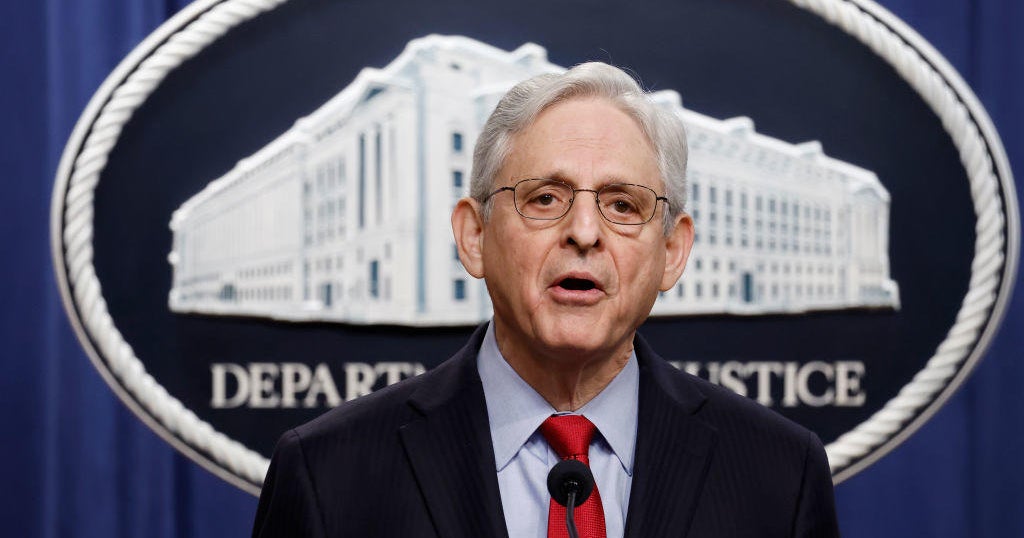Washington – Apple Inc., one of the world's most valuable and influential companies, engaged in illegal anticompetitive behavior in an effort to build a “moat around its smartphone monopoly” and boost its profits at the expense of consumers, the Justice Department has alleged. A blockbuster antitrust lawsuit was filed Thursday.
In a complaint filed in federal district court in New Jersey, the Justice Department accused Apple of using app development rules, iPhone features and hardware that customers use every day, including iMessage, Apple Wallet and smartwatches, to beat out competition and expand its business. By charging higher prices. Fifteen states and the District of Columbia joined the Justice Department as plaintiffs in the case.
“Apple has maintained a monopoly in the smartphone market not by standing ahead of the competition on the merits, but by violating federal antitrust law,” Attorney General Merrick Garland said in comments at Justice Department headquarters. Consumers don't have to pay more because companies break the law.
Apple is an antitrust case
MANDEL NGAN/AFP via Getty Images
their 88 page complaintProsecutors alleged that Apple violated the Sherman Antitrust Act, which states that “by applying a series of reshaping rules and restrictions in its App Store guidelines and developer agreements, it would allow Apple to extract high fees, stifle innovation, provide a less secure or degraded user experience, and throttle competitive alternatives.” .”
Specifically, investigators accused the tech company, which generated nearly $400 billion in revenue last year — by crowding out its smaller rivals by stifling the expansion of so-called “super apps” that offer similar services across devices; disrupt messaging formats and capabilities between Apple and non-Apple devices; And monopolizing tap-to-pay functionality on iPhones only with Apple Wallet.
Users have long been frustrated by inconsistencies when sending messages between Apple and non-Apple products, including lower media quality, reduced editing capabilities, and different colors for messages. Garland said those issues were examples of Apple degrading the user experience to entice them to stay in the ecosystem.
“Any iPhone user who has ever seen a green text message or received a grainy, short video can attest that Apple's anti-competitive behavior makes it very difficult for iPhone users to send messages to users of non-Apple products,” he said. . “It does this by reducing the functionality of its own messaging app and by reducing the functionality of third-party messaging apps.”
Apple's alleged anti-competitive practices don't stop there, however, according to investigators. They allegedly worked by limiting how users interacted with the use of non-Apple smartwatches. iPhone And they used cloud streaming, location services and web browsers on iPhones to edge out smaller competitors.
“Apple's anticompetitive conduct not only restricts competition in the smartphone market, but also reverberates through the industries affected by these restrictions, including financial services, fitness, gaming, social media, news media, entertainment and more,” the complaint states. will be said. “If Apple's anti-competitive and exclusionary behavior is not stopped, it will expand its iPhone monopoly to other markets and parts of the economy.”
The government asked the court to order Apple to stop its anti-competitive behavior and to stop undermining cross-platform services and hardware. The plaintiffs said the court should take the necessary steps to “restore competitive conditions in markets affected by Apple's illegal conduct.”
In response to the lawsuit, Apple said in a statement that the lawsuit “threatens who we are and the principles that differentiate Apple products in fiercely competitive markets.”
“If successful, it would block Apple's ability to create the kind of technology people expect from Apple — connecting hardware, software and services. It would set a dangerous precedent and empower the government to shape people's technology.” The company said. “We believe this case is wrong on the facts and the law, and we will vigorously defend against it.”
Apple isn't the first behemoth in the tech space to face scrutiny from the Justice Department's antitrust division. In the past few years, Google has faced two lawsuits — one during the Trump administration and the other during President Biden's — that it will be said Monopolistic business practices.
Joe Ling Kent and Andres Trie contributed reporting.

